DAVIS Charles (Saxes Inc.)
Born in Mississippi and raised in Chicago. Charles graduated from the famous DuSable High School, studied at the Chicago School of Music and was a private student of John Hauser.
During the 50's, played in the bands of Billie Holliday and Ben Webster, Sun Ra and Dinah Washington. Performed and recorded with Kenny Dorham with whom he had a musical association that lasted many years.
During the 60's, performed and recorded with Elvin Jones and Jimmy Garrison. Illinois Jacquet, Freddie Hubbard, Johnny Griffin, Steve Lacy, Ahmad Jamal and worked with Blue Mitchell, Erskine Hawkins, John Coltrane, Clifford Jordan, among others. In 1964 he won Downbeat Magazine's International Jazz Critics Poll for the baritone saxophone. Performed in the musical production of "The Philosophy of The Spiritual - A Masque of the Black" under the direction of Willie Jones and the auspices of Nadi Qumar. Taught at PS 179 in Brooklyn and was musical director of The Turntable, a nightclub owned by Lloyd Price.
 During the 70's, member of the cooperative group "Artistry in Music" with Hank Mobley, Cedar Walton, Sam Jones and Billy Higgins. He was the co-leader and composer/ arranger for the Baritone Saxophone Retinue, a group featuring six baritone saxophones He made European tours of major jazz festivals and concerts with the Clark Terry Orchestra then toured the USA with Duke Ellington's Orchestra under the direction of Mercer Ellington. Musical director of the Home of the Id nightclub, presenting such artists as Gene Ammons, Randy Weston, Max Roach, as well as producer of Monday Night Boat Ride Up The Hudson presenting, among others, Art Blakey, George Benson, and Etta Jones. Made TV appearances with Archie Shepp, Lucky Thompson, Ossie Davis and Ruby Dec.
During the 70's, member of the cooperative group "Artistry in Music" with Hank Mobley, Cedar Walton, Sam Jones and Billy Higgins. He was the co-leader and composer/ arranger for the Baritone Saxophone Retinue, a group featuring six baritone saxophones He made European tours of major jazz festivals and concerts with the Clark Terry Orchestra then toured the USA with Duke Ellington's Orchestra under the direction of Mercer Ellington. Musical director of the Home of the Id nightclub, presenting such artists as Gene Ammons, Randy Weston, Max Roach, as well as producer of Monday Night Boat Ride Up The Hudson presenting, among others, Art Blakey, George Benson, and Etta Jones. Made TV appearances with Archie Shepp, Lucky Thompson, Ossie Davis and Ruby Dec.
During the 80's, performed and recorded with the Philly Joe Jones Quartet, "Dameronia" and with Abdullah Ibrahim's "Ekaya" in the United States, Europe and Africa. Toured Europe with the "Savoy Seven Plus 1: A Salute to Benny Goodman." With his own quartet, performed in Rome; at the Bologna Jazz Festival, Jazz in Sardinia Festival, and the La Spezia Festival. Was the musical director of the Syncopation nightclub. Performed in the movie, "The Man with Perfect Timing" with Abdullah Ibrahim. In 1984 he was named a "BMI Jazz Pioneer".
During the 90's, musical librarian for Spike Lee's "Mo Better Blues ": performed at the Jamaica Jazz Festival with Dizzy Reece and returned to perform with Roy Burrowes; was in the Apollo Hall of Fame Band accompanying such stars as Ray Charles, Joe Williams, Nancy Wilson, among others. Toured Holland saluting the music of Kenny Dorham; was the guest artist at the 12th. Annual North Carolina Jazz Festival at Duke University, Featured soloist of the Barry Harris Jazz Ensemble and performs in clubs with the Barry Harris/ Charles Davis Quartet. Recorded and toured Europe and Japan with the Clifford Jordan Big Band. Is the tenor saxophonist and a major contributor of musical arrangements with Larry Ridley's "Jazz Legacy Ensemble " which appeared at the Senegal Jazz Festival, performs concerts and conducts clinics, seminars and master classes. This ensemble also appears in an ongoing concert series at the famed Schoenberg Center for Research in Black Culture. Was a featured artist at the Amman, Jordan Jazz Festival, arranged by the American Embassy. Was also the featured artist in clubs and concerts in Paris, Toulouse and Hamburg. Appeared at the Williamstown Theatre Festival in an original production of Eduardo Machado's "Stevie Wants to Play the Blues, "directed by Jim Simpson. Performed in the Three Baritone Saxophone Band with Ronnie Cuber and Gary Smulyan which toured Italy, appeared at the New Orleans Jazz Festival, the 7998 JVC Jazz &. Image Festival at Villa Celimontana in Rome, and Ronnie Scott's Jazz Club in London. Charles was also a featured soloist at the 1998 Chicago Jazz Festival. In June 1999, he performed with Aaron Bell and the Duke Ellington Tribute Orchestra at the Jackie Robinson "Afternoon of Jazz" Festival in Norwalk, CT. Featured artist at the T999.
In the 2000's, featured artist in Rome at "Mississippi Jazz Club" and at the year 2000 Jazz & Image Festival at Villa Celimontana. Also a featured artist at the "Blue Note" in Beirut. Performed with his quartet on the "M.S. Dynasty," a Carnival Lines cruise ship. Several appearances with the Charles Davis/ Barry Harris Quintet at "Sweet Basil" in New York City and at "Birdland." Performed for President Bill Clinton at the "Harlem Welcomes Clinton" celebration. Featured artist at 14th. Annual Jazz Festival in Badajoz, Spain. In 2003, performed with his quartet in Barcelona, Spain and in Salerno and Ferraro, Italy. Also performed with the Charles Davis Trio in San Giovanni, Italy. Also continues to perform in the bands of Roni Ben-Hur, Walter Booker and ELMOllenium (which features the music of Elmo Hope) and with the "Jazz Legacy Ensemble," with Barry Harris and with his own quartet.
Charles is a saxophone instructor of private students from The New School, a teacher at the Lucy Moses School and for over 20 years has been an instructor at the Jazzmobile Workshops.
Charles Davis is a very seldom recorded musician. He has made, in such a long career, only five of his own albums, but is featured on over 100 recordings. I'm happy to share with you the first recorded work of Charles Davis "Ingia!". This is a rare Strata East, often ommited in Davis discographies, which has not been reedited. Davis plays only bari sax, his best horn at my point of view.
Charles Davis baritone sax, Louis Davis (his son) guitar, Andrew "Tex" Allen trumpet & Flugelhorn, Gerald Hayes alto & flute, Ronnie Mathews piano & electric piano, David Williams bass, Louis Hayes drums. All compositions by Charles Davis: The gems of Mims, Little Miss jump up, Linda, Ingia. Recorded July 15, 1974 N.Y.
Charles Davis: Sweet Storyteller by R. J. DeLuke, October 2003.
Theres a difference between the elder statesmen in jazz and the newer firebrands, no matter how talented. One is the formers ability to take their time to tell a story. They've been around life and they're not in a rush. Like Dexter was. And Prez.
Out of that mold is 70-year-old Charles Davis, displaying his rich tenor sax sound and strong baritone sax work on his new CD Blue Gardenia, titled as much for his admiration for Dinah Washington as for his association with Billie Holiday. He played with both, but longer with Washington. Hes not a household name in jazz, but his resume is impressive as is his new music.
Davis is a bopper with a sense of adventure. Hes a smooth storyteller with a sonorous sound influenced by his upbringing in Chicago, a musical hot bed (though he was born in Mississippi). On Blue Gardenia, hes joined by Cedar Walton on piano, bassist Peter Washington and drummer Joe Farnsworth. It's a straight ahead set and a smooth ride.
"It's songs I felt and songs I like. There's more I wanted to do, but we didn't have so much time. But those are some of the ones I liked", says Davis. Its got a taste of blues, bossa and bop, and show Davis great style with melodic improvisation. There are pieces of the great players in his playing, but they've been amalgamated into a personal sound and the world should hear more of Charles Davis.
"The main influence was Lester Young, Charlie Parker, Ben Webster, Coleman Hawkins. Don Byas", he says of his formative days learning the instrument. "Getting out later on, I became friends with John Gilmore, Clifford Jordan. In my neighborhood was John Jenkins and Johnny Griffin. So there was music all around".
He also learned from the singers he worked with. Billie got phrases from Lester Young. Dinah was very clear on her diction. That was always something to listen to, says the soft-spoken sax man.
"I started out on alto. I have played baritone and tenor all along. I was playing baritone with Coltrane. I played tenor with John Gilmore, Clifford Jordan, Johnny Griffin, back in Chicago in the 50s. Ive always played the tenor, he says".
About the CD, Davis says hes very self-critical. "I hear things and I say, I could have done this better. But its like telling a lie, once you do it, it sticks forever. But I enjoyed it, but when you first record something, you think youre the worst sounding individual on the record. Because youre trying to get out all of yourself, and thats an impossibility".
While the recording industry seems to be taking its lumps from musicians in the new millennium, Davis takes things in stride. He says its not a lot different than it ever has been. Musicians arent getting rich, and many arent getting notoriety. But thats not new.
"For the most part, the people I've been involved with seem to be able to come to an amicable agreement about what should be done [on a recording]. There's also an area where an artist should take a suggestion. Some things may be personal, as far as what you want to do, but may not be appropriate at the time. I remember a friend of mine, Eddie Harris, when he put out Exodus, that was one they didn't want. But he got it on there, and that was a hit. Shows you how much they know. Thats happened in a lot of cases, the ones they dont want turn out to be the ones that become most popular".
"Its a language, a dialect, a dialog. You have to learn that. Once you learn the scales, that's one thing. But it's the way the scales are put together in the form of a solo, for improvisation. It's a dialect you have to learn. Some people say you just play, but you don't just play. You have to learn what to say. Lester Young would put it: You have to learn how to tell a story".
Davis began playing in grammar school, then I went to a famous high school in Chicago. DuSable, named after the person that discovered Chicago. John Baptiste Pointe DuSable. We had a tedious bandmaster. A lot of famous musicians came through there. He tutored people like Dinah Washington, Nat Cole, Gene Ammons, Johnny Griffin, Von Freeman. Its a long list.
"The better you got, the more gigs you would come by. I started in high school, playing a few little gigs. People give you $2 or $3. But that was big time then, because you had a gig. The money wasn't the prerequisite then. You play for dances and social events that people have, parties or whatever", he says.
Davis first big break, he says, was getting the call to join Sun Ra, the self-proclaimed being from another planet who combined swinging arrangements with far-out charts from his unique musical mind. "It was great. We sort of had a bebop mystical band. With Pat Patrick, John Gilmore, Julian Priester Arthur Hall, myself, and at one time Richard Evans, a bassist. I still play with the band from time to time".
So big name or not, Davis has played with the greats and blessed their work with his professional approach and sweet style. His tenure with Lady Day came about when she toured through the city, as so many jazz acts did. "That was through a bandmate in Chicago called Al Smith. I periodically played with him from time to time. He got the gig and she came into a place called Budland, at the time. The guy opened it up as Birdland, but Birdland in New York made him change it. She was there for three or four months. It was great. Along with her, was Ben Webster. I was playing in a band that was backing her and Ben was doing feature solos. She was great to work with. She had a heck of a command and stage presence when she came on. She was very professional".
"After Billie Holliday, I went on the road with Clarence Henry. He was a protge of Fats Domino. He had the record out "I Could Sing Like a Frog". It was like rock and roll or whatever you want to call it. I stayed with him a few months. Then I came back and I started working with Dinah Washington. Along with Eddie Chamblee, Julian Priester, Melvin Moore and myself, and later on Jack Wilson and Richard Evans. This was in 1958 or 1959. After the band broke up, I worked for her on a few more occasions".
"After Dinah, I made a trip to California. After six months I had to get out of there. I came back, went from Chicago to New York, then started working with Kenny Dorham. That lasted a few years. Been in New York ever since. I worked with John Coltrane, Illinois Jacquet, Clark Terry, Thad Jones-Mel Lewis. I was in the band when Thad quit. We did about three months in Europe. I worked with Erskine Hawkins".
Today, Davis continues to work steadily in these tough times for musicians. "I'm still gigging around New York. I'll be in Birdland with Barry Harris. I'm going to Japan for a few days and do a concert in Italy after that. I'm hanging in there".
"It's up and down", says Davis with no hint of bitterness or undue concern. "That's the reality of life. I'd like to have gigs in abundance, but I don't have them. You still have to maintain. Keep going. There's always going to be a complaint. If you have 1,000, you want 10,000, and if you have that, you want 50,000. Its always something".
The propensity for record labels to look for the new young lions, often overlooking some of jazzs major contributors in the process, who are still going and still goring, also doesn't phase Davis. "That's nothing new. That always happened. You still have to maintain what your'e doing. You can't let that bother you. At one point, you have to get a name, and when you get a name, its not big enough. That happens to all of us. That's just part of the realities of being a jazz and bebop musician. And for those who don't like it, You can go to the other side (pop) and work all the time".
While his friend and influence saxophonist George Coleman talks of retiring (He's retiring every year. God Bless him if he can do it. There are only two musicians that I knew of that retired. Sid Catlett and Jonah Jones), Davis says that it's not in the cards for him. He'll continue to tote his horn and tell his stories and please audiences wherever he can.
Like Duke Ellington said: Retire to what? "I don't have an eye for retiring right now", he says, adding with a sparkle, "but I could come into a lot of money and live the good life, though".
As for the future of jazz from his spot as a veteran musician, Davis isn't dissuaded. The music has been through tough times and will continue to persevere.
"It was supposed to have been squashed years ago, with the onset of bebop. But as long as you have records of Charlie Parker and Miles Davis and Coltrane and Sonny Rollins, the young kids make new discoveries. The younger kids are into it, so I think it will be around for a long time".
His advice to those who are coming up that will keep the flame?
 Now 70, Davis continues to exercise his instrumental voice as soloist; this time out he employs a 50-50 balance between baritone and tenor. The leaders solo saxophone voice stands sweet and melodic, but the session turns uneven in places due to a few slips of pitch control on baritone. Cedar Walton, Peter Washington and Joe Farnsworth do more than their share to make up for it with a hands-down rock-solid foundation for each piece.
Now 70, Davis continues to exercise his instrumental voice as soloist; this time out he employs a 50-50 balance between baritone and tenor. The leaders solo saxophone voice stands sweet and melodic, but the session turns uneven in places due to a few slips of pitch control on baritone. Cedar Walton, Peter Washington and Joe Farnsworth do more than their share to make up for it with a hands-down rock-solid foundation for each piece.
On tenor, Davis sends a lovely melodic message that calls upon his vast experience for flavor. Texas Moon recalls time he's spent on the road with Hank Crawford, while Blues for Yahoo moves more in the hard bop direction of New York City. Yahoo is the producers dog, who must have inherited Charlie Parker's uptempo grit. Either that, or he simply reminded Davis of Birds unique soul. Blue Gardenia, a solid straightahead album, swings with tradition and a true, blues-based spirit.
Track listing: A Beautiful Friendship, Texas Moon, Bossa Joe, Stranded, Shadow of the Sunset, Sabia, Blues for Yahoo, Blue Gardenia, Sing Me Back Home, Lone Pilgrim.
Personnel: Charles Davis baritone & tenor saxophone, Cedar Walton piano, Peter Washington bass, Joe Farnsworth drums.
During the 50's, played in the bands of Billie Holliday and Ben Webster, Sun Ra and Dinah Washington. Performed and recorded with Kenny Dorham with whom he had a musical association that lasted many years.
During the 60's, performed and recorded with Elvin Jones and Jimmy Garrison. Illinois Jacquet, Freddie Hubbard, Johnny Griffin, Steve Lacy, Ahmad Jamal and worked with Blue Mitchell, Erskine Hawkins, John Coltrane, Clifford Jordan, among others. In 1964 he won Downbeat Magazine's International Jazz Critics Poll for the baritone saxophone. Performed in the musical production of "The Philosophy of The Spiritual - A Masque of the Black" under the direction of Willie Jones and the auspices of Nadi Qumar. Taught at PS 179 in Brooklyn and was musical director of The Turntable, a nightclub owned by Lloyd Price.
 During the 70's, member of the cooperative group "Artistry in Music" with Hank Mobley, Cedar Walton, Sam Jones and Billy Higgins. He was the co-leader and composer/ arranger for the Baritone Saxophone Retinue, a group featuring six baritone saxophones He made European tours of major jazz festivals and concerts with the Clark Terry Orchestra then toured the USA with Duke Ellington's Orchestra under the direction of Mercer Ellington. Musical director of the Home of the Id nightclub, presenting such artists as Gene Ammons, Randy Weston, Max Roach, as well as producer of Monday Night Boat Ride Up The Hudson presenting, among others, Art Blakey, George Benson, and Etta Jones. Made TV appearances with Archie Shepp, Lucky Thompson, Ossie Davis and Ruby Dec.
During the 70's, member of the cooperative group "Artistry in Music" with Hank Mobley, Cedar Walton, Sam Jones and Billy Higgins. He was the co-leader and composer/ arranger for the Baritone Saxophone Retinue, a group featuring six baritone saxophones He made European tours of major jazz festivals and concerts with the Clark Terry Orchestra then toured the USA with Duke Ellington's Orchestra under the direction of Mercer Ellington. Musical director of the Home of the Id nightclub, presenting such artists as Gene Ammons, Randy Weston, Max Roach, as well as producer of Monday Night Boat Ride Up The Hudson presenting, among others, Art Blakey, George Benson, and Etta Jones. Made TV appearances with Archie Shepp, Lucky Thompson, Ossie Davis and Ruby Dec.During the 80's, performed and recorded with the Philly Joe Jones Quartet, "Dameronia" and with Abdullah Ibrahim's "Ekaya" in the United States, Europe and Africa. Toured Europe with the "Savoy Seven Plus 1: A Salute to Benny Goodman." With his own quartet, performed in Rome; at the Bologna Jazz Festival, Jazz in Sardinia Festival, and the La Spezia Festival. Was the musical director of the Syncopation nightclub. Performed in the movie, "The Man with Perfect Timing" with Abdullah Ibrahim. In 1984 he was named a "BMI Jazz Pioneer".
During the 90's, musical librarian for Spike Lee's "Mo Better Blues ": performed at the Jamaica Jazz Festival with Dizzy Reece and returned to perform with Roy Burrowes; was in the Apollo Hall of Fame Band accompanying such stars as Ray Charles, Joe Williams, Nancy Wilson, among others. Toured Holland saluting the music of Kenny Dorham; was the guest artist at the 12th. Annual North Carolina Jazz Festival at Duke University, Featured soloist of the Barry Harris Jazz Ensemble and performs in clubs with the Barry Harris/ Charles Davis Quartet. Recorded and toured Europe and Japan with the Clifford Jordan Big Band. Is the tenor saxophonist and a major contributor of musical arrangements with Larry Ridley's "Jazz Legacy Ensemble " which appeared at the Senegal Jazz Festival, performs concerts and conducts clinics, seminars and master classes. This ensemble also appears in an ongoing concert series at the famed Schoenberg Center for Research in Black Culture. Was a featured artist at the Amman, Jordan Jazz Festival, arranged by the American Embassy. Was also the featured artist in clubs and concerts in Paris, Toulouse and Hamburg. Appeared at the Williamstown Theatre Festival in an original production of Eduardo Machado's "Stevie Wants to Play the Blues, "directed by Jim Simpson. Performed in the Three Baritone Saxophone Band with Ronnie Cuber and Gary Smulyan which toured Italy, appeared at the New Orleans Jazz Festival, the 7998 JVC Jazz &. Image Festival at Villa Celimontana in Rome, and Ronnie Scott's Jazz Club in London. Charles was also a featured soloist at the 1998 Chicago Jazz Festival. In June 1999, he performed with Aaron Bell and the Duke Ellington Tribute Orchestra at the Jackie Robinson "Afternoon of Jazz" Festival in Norwalk, CT. Featured artist at the T999.
In the 2000's, featured artist in Rome at "Mississippi Jazz Club" and at the year 2000 Jazz & Image Festival at Villa Celimontana. Also a featured artist at the "Blue Note" in Beirut. Performed with his quartet on the "M.S. Dynasty," a Carnival Lines cruise ship. Several appearances with the Charles Davis/ Barry Harris Quintet at "Sweet Basil" in New York City and at "Birdland." Performed for President Bill Clinton at the "Harlem Welcomes Clinton" celebration. Featured artist at 14th. Annual Jazz Festival in Badajoz, Spain. In 2003, performed with his quartet in Barcelona, Spain and in Salerno and Ferraro, Italy. Also performed with the Charles Davis Trio in San Giovanni, Italy. Also continues to perform in the bands of Roni Ben-Hur, Walter Booker and ELMOllenium (which features the music of Elmo Hope) and with the "Jazz Legacy Ensemble," with Barry Harris and with his own quartet.
Charles is a saxophone instructor of private students from The New School, a teacher at the Lucy Moses School and for over 20 years has been an instructor at the Jazzmobile Workshops.
Charles Davis is a very seldom recorded musician. He has made, in such a long career, only five of his own albums, but is featured on over 100 recordings. I'm happy to share with you the first recorded work of Charles Davis "Ingia!". This is a rare Strata East, often ommited in Davis discographies, which has not been reedited. Davis plays only bari sax, his best horn at my point of view.
INGIA ! 1974 LP STRATA EAST 7425
Charles Davis baritone sax, Louis Davis (his son) guitar, Andrew "Tex" Allen trumpet & Flugelhorn, Gerald Hayes alto & flute, Ronnie Mathews piano & electric piano, David Williams bass, Louis Hayes drums. All compositions by Charles Davis: The gems of Mims, Little Miss jump up, Linda, Ingia. Recorded July 15, 1974 N.Y.
Charles Davis: Sweet Storyteller by R. J. DeLuke, October 2003.
Theres a difference between the elder statesmen in jazz and the newer firebrands, no matter how talented. One is the formers ability to take their time to tell a story. They've been around life and they're not in a rush. Like Dexter was. And Prez.
Out of that mold is 70-year-old Charles Davis, displaying his rich tenor sax sound and strong baritone sax work on his new CD Blue Gardenia, titled as much for his admiration for Dinah Washington as for his association with Billie Holiday. He played with both, but longer with Washington. Hes not a household name in jazz, but his resume is impressive as is his new music.
Davis is a bopper with a sense of adventure. Hes a smooth storyteller with a sonorous sound influenced by his upbringing in Chicago, a musical hot bed (though he was born in Mississippi). On Blue Gardenia, hes joined by Cedar Walton on piano, bassist Peter Washington and drummer Joe Farnsworth. It's a straight ahead set and a smooth ride.
"It's songs I felt and songs I like. There's more I wanted to do, but we didn't have so much time. But those are some of the ones I liked", says Davis. Its got a taste of blues, bossa and bop, and show Davis great style with melodic improvisation. There are pieces of the great players in his playing, but they've been amalgamated into a personal sound and the world should hear more of Charles Davis.
"The main influence was Lester Young, Charlie Parker, Ben Webster, Coleman Hawkins. Don Byas", he says of his formative days learning the instrument. "Getting out later on, I became friends with John Gilmore, Clifford Jordan. In my neighborhood was John Jenkins and Johnny Griffin. So there was music all around".
He also learned from the singers he worked with. Billie got phrases from Lester Young. Dinah was very clear on her diction. That was always something to listen to, says the soft-spoken sax man.
"I started out on alto. I have played baritone and tenor all along. I was playing baritone with Coltrane. I played tenor with John Gilmore, Clifford Jordan, Johnny Griffin, back in Chicago in the 50s. Ive always played the tenor, he says".
About the CD, Davis says hes very self-critical. "I hear things and I say, I could have done this better. But its like telling a lie, once you do it, it sticks forever. But I enjoyed it, but when you first record something, you think youre the worst sounding individual on the record. Because youre trying to get out all of yourself, and thats an impossibility".
While the recording industry seems to be taking its lumps from musicians in the new millennium, Davis takes things in stride. He says its not a lot different than it ever has been. Musicians arent getting rich, and many arent getting notoriety. But thats not new.
"For the most part, the people I've been involved with seem to be able to come to an amicable agreement about what should be done [on a recording]. There's also an area where an artist should take a suggestion. Some things may be personal, as far as what you want to do, but may not be appropriate at the time. I remember a friend of mine, Eddie Harris, when he put out Exodus, that was one they didn't want. But he got it on there, and that was a hit. Shows you how much they know. Thats happened in a lot of cases, the ones they dont want turn out to be the ones that become most popular".
"Its a language, a dialect, a dialog. You have to learn that. Once you learn the scales, that's one thing. But it's the way the scales are put together in the form of a solo, for improvisation. It's a dialect you have to learn. Some people say you just play, but you don't just play. You have to learn what to say. Lester Young would put it: You have to learn how to tell a story".
Davis began playing in grammar school, then I went to a famous high school in Chicago. DuSable, named after the person that discovered Chicago. John Baptiste Pointe DuSable. We had a tedious bandmaster. A lot of famous musicians came through there. He tutored people like Dinah Washington, Nat Cole, Gene Ammons, Johnny Griffin, Von Freeman. Its a long list.
"The better you got, the more gigs you would come by. I started in high school, playing a few little gigs. People give you $2 or $3. But that was big time then, because you had a gig. The money wasn't the prerequisite then. You play for dances and social events that people have, parties or whatever", he says.
Davis first big break, he says, was getting the call to join Sun Ra, the self-proclaimed being from another planet who combined swinging arrangements with far-out charts from his unique musical mind. "It was great. We sort of had a bebop mystical band. With Pat Patrick, John Gilmore, Julian Priester Arthur Hall, myself, and at one time Richard Evans, a bassist. I still play with the band from time to time".
So big name or not, Davis has played with the greats and blessed their work with his professional approach and sweet style. His tenure with Lady Day came about when she toured through the city, as so many jazz acts did. "That was through a bandmate in Chicago called Al Smith. I periodically played with him from time to time. He got the gig and she came into a place called Budland, at the time. The guy opened it up as Birdland, but Birdland in New York made him change it. She was there for three or four months. It was great. Along with her, was Ben Webster. I was playing in a band that was backing her and Ben was doing feature solos. She was great to work with. She had a heck of a command and stage presence when she came on. She was very professional".
"After Billie Holliday, I went on the road with Clarence Henry. He was a protge of Fats Domino. He had the record out "I Could Sing Like a Frog". It was like rock and roll or whatever you want to call it. I stayed with him a few months. Then I came back and I started working with Dinah Washington. Along with Eddie Chamblee, Julian Priester, Melvin Moore and myself, and later on Jack Wilson and Richard Evans. This was in 1958 or 1959. After the band broke up, I worked for her on a few more occasions".
"After Dinah, I made a trip to California. After six months I had to get out of there. I came back, went from Chicago to New York, then started working with Kenny Dorham. That lasted a few years. Been in New York ever since. I worked with John Coltrane, Illinois Jacquet, Clark Terry, Thad Jones-Mel Lewis. I was in the band when Thad quit. We did about three months in Europe. I worked with Erskine Hawkins".
Today, Davis continues to work steadily in these tough times for musicians. "I'm still gigging around New York. I'll be in Birdland with Barry Harris. I'm going to Japan for a few days and do a concert in Italy after that. I'm hanging in there".
"It's up and down", says Davis with no hint of bitterness or undue concern. "That's the reality of life. I'd like to have gigs in abundance, but I don't have them. You still have to maintain. Keep going. There's always going to be a complaint. If you have 1,000, you want 10,000, and if you have that, you want 50,000. Its always something".
The propensity for record labels to look for the new young lions, often overlooking some of jazzs major contributors in the process, who are still going and still goring, also doesn't phase Davis. "That's nothing new. That always happened. You still have to maintain what your'e doing. You can't let that bother you. At one point, you have to get a name, and when you get a name, its not big enough. That happens to all of us. That's just part of the realities of being a jazz and bebop musician. And for those who don't like it, You can go to the other side (pop) and work all the time".
While his friend and influence saxophonist George Coleman talks of retiring (He's retiring every year. God Bless him if he can do it. There are only two musicians that I knew of that retired. Sid Catlett and Jonah Jones), Davis says that it's not in the cards for him. He'll continue to tote his horn and tell his stories and please audiences wherever he can.
Like Duke Ellington said: Retire to what? "I don't have an eye for retiring right now", he says, adding with a sparkle, "but I could come into a lot of money and live the good life, though".
As for the future of jazz from his spot as a veteran musician, Davis isn't dissuaded. The music has been through tough times and will continue to persevere.
"It was supposed to have been squashed years ago, with the onset of bebop. But as long as you have records of Charlie Parker and Miles Davis and Coltrane and Sonny Rollins, the young kids make new discoveries. The younger kids are into it, so I think it will be around for a long time".
His advice to those who are coming up that will keep the flame?
"Blue Gardenia" reviewed by Jim Santella. Reade Street Records (2003)
 Now 70, Davis continues to exercise his instrumental voice as soloist; this time out he employs a 50-50 balance between baritone and tenor. The leaders solo saxophone voice stands sweet and melodic, but the session turns uneven in places due to a few slips of pitch control on baritone. Cedar Walton, Peter Washington and Joe Farnsworth do more than their share to make up for it with a hands-down rock-solid foundation for each piece.
Now 70, Davis continues to exercise his instrumental voice as soloist; this time out he employs a 50-50 balance between baritone and tenor. The leaders solo saxophone voice stands sweet and melodic, but the session turns uneven in places due to a few slips of pitch control on baritone. Cedar Walton, Peter Washington and Joe Farnsworth do more than their share to make up for it with a hands-down rock-solid foundation for each piece.On tenor, Davis sends a lovely melodic message that calls upon his vast experience for flavor. Texas Moon recalls time he's spent on the road with Hank Crawford, while Blues for Yahoo moves more in the hard bop direction of New York City. Yahoo is the producers dog, who must have inherited Charlie Parker's uptempo grit. Either that, or he simply reminded Davis of Birds unique soul. Blue Gardenia, a solid straightahead album, swings with tradition and a true, blues-based spirit.
Track listing: A Beautiful Friendship, Texas Moon, Bossa Joe, Stranded, Shadow of the Sunset, Sabia, Blues for Yahoo, Blue Gardenia, Sing Me Back Home, Lone Pilgrim.
Personnel: Charles Davis baritone & tenor saxophone, Cedar Walton piano, Peter Washington bass, Joe Farnsworth drums.
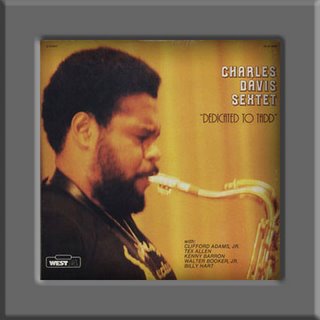
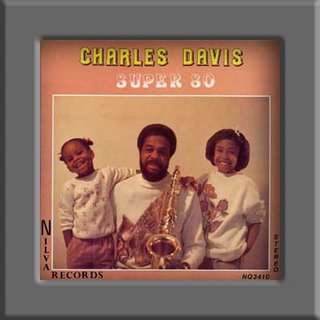
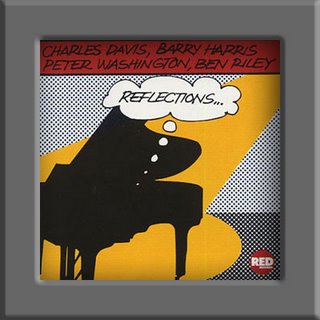
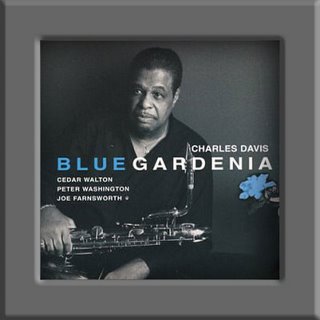
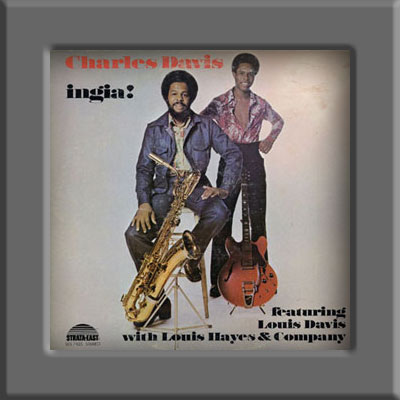
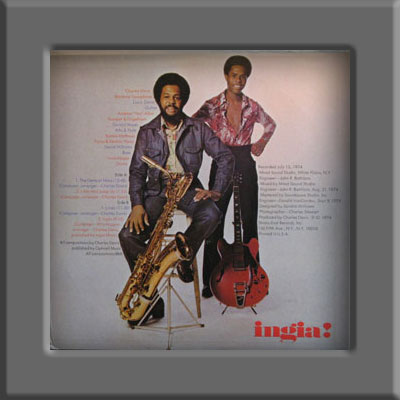
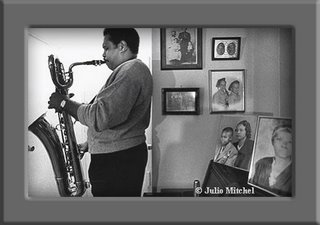
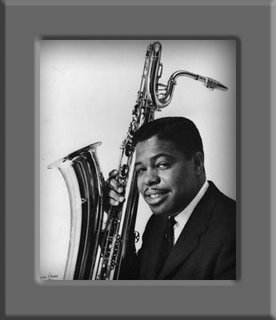


5 comments:
hi, i guess this is what i apreciate the most in a jazz blog:rare sideman and impossible to find records.i think i noticed charles davis at first on leos parker let me tell you about it,and liked his playing.so thanks for these rare records very much apreciated.waynes
YOU'LL FIND HIM ON MANY SESSIONS BEFORE HE RECORDED AS A LEADER...
merci des renseignements.autre question:y a til beaucoup d'enregistrements de nathan davis avec woody shaw?
WAYNES. IL Y A TOUS LES RENS DISCO ICI. http://www.nathandavisjazz.com/discography.html
IL FAUDRAIT QUE JE RECHERCHE MAIS, DE MEMOIRE, J'AI UN LP "SONET": PARIS REUNION BAND. W SHAW, DIZZY REECE, DAVIS, GRIFFIN ET AUTRES. DU BEAU MONDE. A STOCKHOLM EN 1985. A POSTER UN JOUR! BEST. DANIEL
merci du tuyau et pour la musique.waynes
Post a Comment